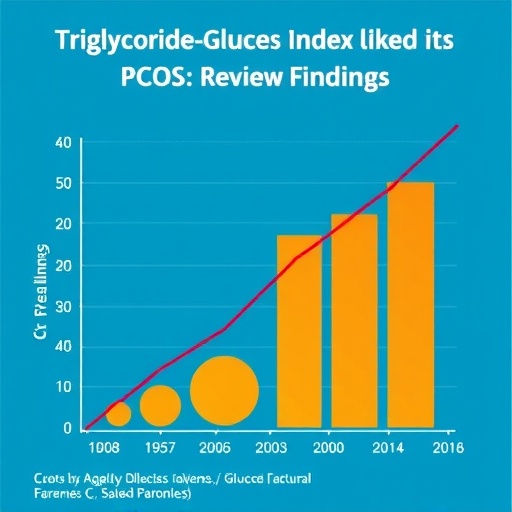In recent years, there has been increasing interest in the connection between metabolic syndrome and reproductive disorders. A groundbreaking study conducted by Javidan, Azarboo, Jalali, and their team has shed light on the intricate relationship between the triglyceride-glucose (TyG) index and polycystic ovary syndrome (PCOS), a prevalent endocrine disorder among women of reproductive age. Their systematic review and meta-analysis, which builds on existing data from diverse populations, is set to be published in the Journal of Ovarian Research and promises to be a remarkable contribution to the field of reproductive endocrinology.
Polycystic ovary syndrome is characterized by a myriad of symptoms, including irregular menstrual cycles, excessive androgen levels, and the presence of polycystic ovaries. It is often associated with insulin resistance and contributes to metabolic dysfunction, which can lead to severe long-term health issues, including type 2 diabetes, cardiovascular disease, and infertility. Given the global prevalence of this syndrome, understanding the underlying mechanisms is critical for developing effective interventions and management strategies.
The triglyceride-glucose index has emerged as a novel and non-invasive marker for assessing insulin resistance. This index is derived from simple laboratory measurements of triglycerides and glucose, making it an attractive alternative to more complex and costly tests for insulin sensitivity. Previous studies have indicated that elevated levels of the TyG index may reflect a higher risk of developing metabolic disorders, particularly in individuals with pre-existing conditions such as obesity or diabetes.
Javidan et al.’s research brings forth compelling evidence about the association between the TyG index and PCOS. By conducting a systematic review and meta-analysis, they synthesized findings from various studies that explored this relationship in different demographics. The robustness of their analysis lies in the fact that it encompasses diverse populations, which can significantly enhance the generalizability of their conclusions. This is particularly important, as genetic, environmental, and lifestyle factors can influence the manifestation of both PCOS and related metabolic disturbances.
One of the key takeaways from their study is the clear delineation between the TyG index levels in women diagnosed with PCOS compared to those without the condition. The results indicated significantly higher TyG indices in PCOS patients, suggesting a potential role of this index as a prognostic tool for identifying women at risk of developing metabolic syndrome secondary to hormonal dysfunction. This could revolutionize the approach towards early diagnosis and intervention in reproductive health.
Furthermore, the research underscores the necessity of integrating metabolic assessment in the clinical management of PCOS. The implications of a high TyG index extend beyond mere identification of individuals at risk; they potentially signal the need for holistic management strategies that address not only reproductive health but also metabolic well-being. This integrated approach could ultimately mitigate the long-term risks associated with PCOS, including the development of comorbidities.
As the scientific community delves deeper into the mechanistic pathways linking insulin resistance to PCOS, it is crucial to recognize the multi-factorial nature of the syndrome. The interplay between hormonal factors, metabolic health, and lifestyle choices such as diet and physical activity cannot be understated. Javidan et al.’s findings highlight the importance of adopting a comprehensive view that considers not only the physiological aspects of PCOS but also the broader lifestyle context of affected individuals.
Additionally, the publication serves as a clarion call for further research into the mechanisms underlying the TyG index and its impact on PCOS. While the data presented in the systematic review provide invaluable insights, there remains a vast expanse of knowledge yet to be explored. Future studies should aim to investigate causative pathways and potentially modifiable risk factors that could serve as targets for intervention.
Moreover, the societal implications of understanding the TyG index’s association with PCOS are profound. As awareness of PCOS grows, it is imperative for healthcare professionals to be equipped with the necessary tools and knowledge to address this condition effectively. This includes not only recognizing the symptoms of PCOS but also understanding the metabolic implications that accompany it. A well-informed approach can empower both healthcare providers and patients to make proactive decisions regarding lifestyle changes and treatment options.
In conclusion, Javidan et al.’s systematic review and meta-analysis on the association between the triglyceride-glucose index and polycystic ovary syndrome is a significant stride toward unraveling the complexities of this common yet often misunderstood condition. Their findings solidify the TyG index as a potential key player in the early identification and management of PCOS, offering hope for improved health outcomes for millions of women worldwide. As researchers continue to explore this relationship, the potential for innovative strategies to manage PCOS and promote metabolic health is more promising than ever.
In an era where women’s health issues are gaining increasing attention, studies such as this highlight the importance of ongoing research and the potential for new insights to influence clinical practice. The confluence of reproductive health and metabolic conditions necessitates a forward-thinking and integrative approach to research and healthcare delivery. By bridging the gap between metabolic and reproductive health, researchers are laying the groundwork for more personalized and effective interventions for women with PCOS.
Ultimately, the findings from this study emphasize that addressing PCOS is not just about managing a reproductive condition; it is intrinsically linked to understanding and managing the wider spectrum of health concerns that accompany it. With continued research and a multidisciplinary approach, the future holds the promise of advancing women’s health, improving quality of life, and reducing the long-term health risks associated with polycystic ovary syndrome.
Subject of Research: The association between triglyceride-glucose index and polycystic ovary syndrome.
Article Title: The association between triglyceride-glucose index and polycystic ovary syndrome: a systematic review and meta-analysis across different populations.
Article References:
Javidan, A., Azarboo, A., Jalali, S. et al. The association between triglyceride-glucose index and polycystic ovary syndrome: a systematic review and meta-analysis across different populations.
J Ovarian Res 18, 163 (2025). https://doi.org/10.1186/s13048-025-01717-z
Image Credits: AI Generated
DOI: 10.1186/s13048-025-01717-z
Keywords: triglyceride-glucose index, polycystic ovary syndrome, insulin resistance, metabolic syndrome, women’s health, systematic review, meta-analysis.




